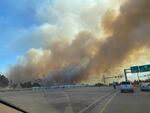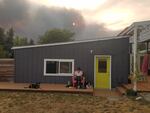Wildfires are raging across hundreds of thousands of acres in Oregon and Washington this week — and forcing tens of thousands of people to evacuate their homes.
One of them is Jefferson Public Radio reporter April Ehrlich. She joined OPB “Morning Edition” host Geoff Norcross Wednesday to talk about her own experience.
You can listen to the full conversation using the audio player at the top of this story.
Geoff Norcross: Let’s start with the latest. What is the situation in your part of Oregon right now?
April Ehrlich: “There are a lot of wildfires. There were a few of them that erupted in Jackson County yesterday, but the most devastating one so far has been the Almeda Drive Fire. Last I checked, it was about 3,000 acres large and impacting mostly residential areas north of Ashland so that that includes the cities of Phoenix, Talent and South Medford. I had to drive about an hour north to Grants Pass to find a safe place to sleep. It was pretty smoky last night, but it’s cleared up. And now we are not under immediate threat of wildfire.”
Norcross: I know journalists hate to become part of the story, but you’ve had an odyssey over the past few days trying to get to a place that is safe. Walk us through where you started and where you ended up.
Ehrlich: "Yesterday started out like a pretty nice day. The sky was actually pretty clear, but it was really windy. By late morning, I started to get alerts about a fire near the Ashland dog park. I got my reporting gear and I headed out. But as soon as I got out there to the highway, I became stuck in traffic, and I could see this huge plume of smoke overhead. It looked like it was right there, right by my house.

Smoke from nearby wildfires fills the sky are Jefferson Public Radio reporter April Ehrlich drives for the Interstate 5 on-ramp in Phoenix, Ore., on Tuesday, Sept. 8, 2020. Thousands of Oregonians have been forced to flee their homes as wildfires kicked up by dry, windy conditions swell across the state.
April Ehrlich
“So I realized that I had to run home and help my husband pack our two dogs and our two cats and prepare to evacuate. We drove to a friend’s house in southern Medford, which seemed like it was going to be pretty safe, but the fire kept heading toward us, so we had to evacuate again. Last night, we ended up in another friend’s house in Grants Pass where we slept on our friend’s patio furniture in their backyard with our dogs.”
Norcross: Do you know what’s going on with your home?
Ehrlich: “Well, yes and no. Someone posted a video of our neighborhood, and I could see on one side of the street, almost all of the houses were on fire, completely engulfed in flames. On my side of the street, they look fine. I’m really hoping that when I try going back today that that’s still the case. I did see my house in that video, and it was still standing, and I really hope it’s still there.”

Jefferson Public Radio reporter April Ehrlich reports from a friend's backyard in Medford, Ore., after evacuating her home due to a nearby wildfire on Tuesday, Sept. 8, 2020. Ehrlich had to evacuate further after this photo was taken.
Jes Burns
Norcross: We’ve seen evacuation orders now for dozens of communities in Oregon. Is there one in your part of the state that you’re particularly worried about?
Ehrlich: “I’m particularly worried about the small communities of Talent and Phoenix, where there are a lot of low income and minority families. This fire mostly followed Bear Creek, which runs from Ashland up toward Medford, and it’s lined with a lot of mobile home parks. A lot of people who live in those parks are farmworker families or seniors on fixed incomes. I’m seeing a lot of photos online of those parks, and they looked decimated.”
Related: Evacuees from Santiam Canyon firestorm spend uncertain times pondering loss and hope
Norcross: Having been through evacuating now, is there advice you would give other people in Oregon and Washington about how to prepare?
Ehrlich: “I’ve been reporting on wildfires for several years, so I’ve spoken to a lot of people about how to best be prepared. I took that advice pretty seriously, and I think it worked well for me, as best as it could have. I had a to-go bag full of clothes, medications, things for my pets and an inventory of what was in that bag and a to-do list. So as soon as we had to start preparing, I went through the to-do list. I went through the inventory. I knew hotels would be booked, so I packed all my camping gear. That’s really helped us out.”
Norcross: Many of us have experienced the smoky skies of wildfire season. Can you describe what you’ve seen and smelled in the past few days and how it compares with earlier fire seasons?
Ehrlich: “Normally, when I cover a wildfire, I get there a day after it’s already erupted. The smoke is in the air, but it’s a lot older. Here in the Rogue Valley, when we get smoke generally that smoke is coming from other counties or other states. So it’s got this old smoke smell, like a ashtray that’s been left in a closet for a few decades. This right now it smells like fresh fire, like a campfire, like the flames are right there in front of you. And it’s pretty frightening.”



